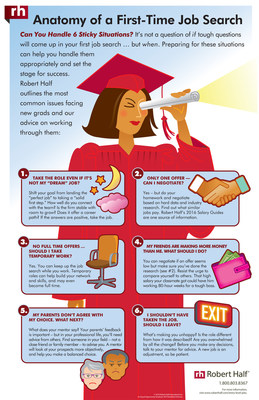Press Releases
Read about our latest research, including results from our ongoing surveys of senior managers and workers, and company announcements.
Fear of Missing Out, Managing Parents' Expectations Among the Issues; Recruiting Expert Gives Tips
MENLO PARK, Calif., May 11, 2016 /PRNewswire/ -- The future looks bright for the Class of 2016, as research shows organizations plan to hire more college graduates compared to last year. But the search can be filled with detours and tough questions. How new grads react to these situations can set their career on the right course — or take them off track. Staffing firm Robert Half outlines six of the most common conundrums facing new grads with tips for how to approach them.

View the infographic.
Sticky situation #1: I have two offers but neither is my 'dream job.' How do I decide?
Don't think in terms of landing the perfect position (which may be out of reach with your limited experience). Instead, think of making a solid first step. Set aside starting salary and job title, and ask yourself: How well do I connect with my prospective manager? Is the organization stable with room to grow? Which is the better fit in terms of people, culture and industry?
Sticky situation #2: I only have one job offer. Can I negotiate the salary?
Yes — but negotiate based on hard data and industry research. (Robert Half's 2016 Salary Guides are one source.) The hiring manager may not be able to flex on pay, so consider what else you might negotiate, like schedule flexibility, more vacation or training. Forty percent of CFOs surveyed said they are willing to negotiate perks.
Sticky situation #3: I haven't landed a full-time job yet. Should I take a temporary job or post-college internship?
For new grads, doing some type of work is better than not working at all, so take the temporary position or internship. You can always continue your search while you work, and the role could build your network and skills, and may even become full time. Be sure to add any work experience — paid or not — to your resume and LinkedIn profile. More than half (51 percent) of senior managers interviewed consider consistent temporary work equivalent to full-time employment.
Sticky situation #4: I have an offer, but it pays less than my friends with the same degree are making. Should I take it?
The fear of missing out — on a great job, high salary or cool perk — is very real as new grads transition from being part of the same college group into diverse career paths. If you receive a low offer, you can negotiate (see #2). But resist the urge to compare yourself with others or wonder "what if?" That high salary your classmate got could have him working 80-hour weeks for a difficult boss. In our Generation Z study, growth opportunities outranked pay on the list of top job search priorities.
Sticky situation #5: My parents don't want me to take this job. What should I do?
Eighty-two percent of respondents in a Generation Z study said their parents will influence their career decisions. But as you begin your career, you need to balance their input with that from a professional mentor. Find someone in your chosen field who can advise you. Research LinkedIn, connect with local professional associations and ask college professors for referrals. Many people are willing to serve as mentors to new grads. A mentor will look at your career prospects from a more objective lens than those in your inner circle. While 86 percent of CFOs believe having a mentor is important for career development, only 26 percent of workers have one.
Sticky situation #6: I'm a few weeks into the role and think I made a mistake. Should I give notice?
Drill into the core problem. Is the actual role different from how it was described to you? Are you overwhelmed by the change? Before you make any decisions, talk to your professional mentor for advice. Every new job takes some adjustment, so be patient.
Paul McDonald, senior executive director at Robert Half, offers these points to help new grads be successful in their first professional job:
- Keep an open mind. Flexibility and a positive outlook go a long way in adjusting to a new role — everyone appreciates proactive and nimble workers.
- Give, don't just take. Be of service at every stage of your career. Offer to help those still looking for work, as well as college juniors who will be new grads this time next year.
- Strike a balance. Work hard but don't neglect other parts of your life, including your family, friends, hobbies and professional connections.
- Manage your reputation. It follows you wherever you go. Do what you say you are going to do, and keep your social media profiles free from questionable content.
- Continue to invest in yourself. Today's workplace requires lifelong learning, and your college degree is just the beginning. Think about what skills will get you to the next level and make a plan for acquiring them.
About Robert Half
Founded in 1948, Robert Half is the world's first and largest specialized staffing firm. The company has more than 340 staffing locations worldwide and offers online job search services on its divisional websites, all of which can be accessed at roberthalf.com. The site's Student and New Graduate Center offers resources entry-level professionals can use to start their career search.

Logo - http://photos.prnewswire.com/prnh/20160212/332877LOGO
Photo - http://photos.prnewswire.com/prnh/20160511/366375-INFO
SOURCE Robert Half